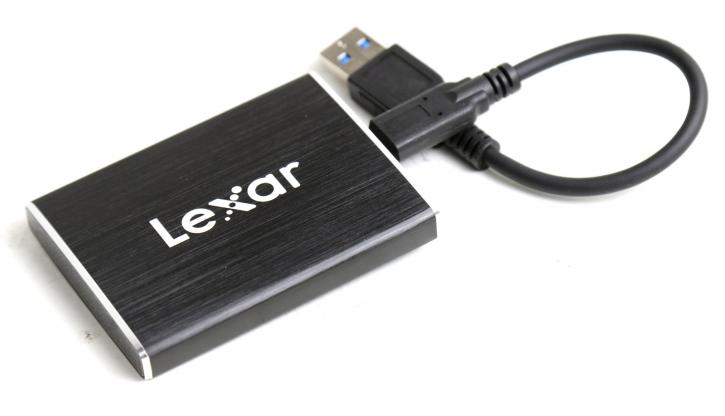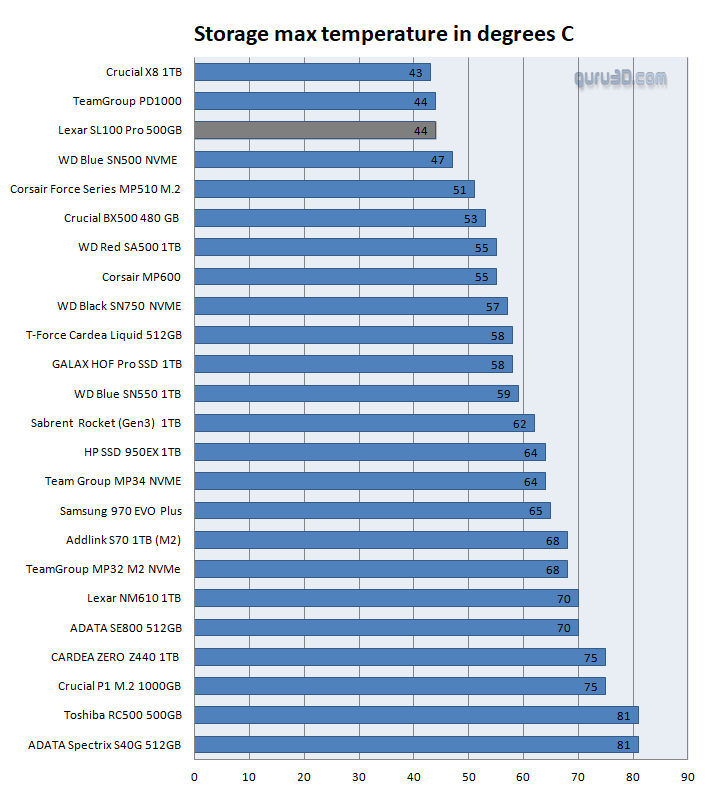Final Words & Conclusion
Final Words & Conclusion
Portable USB storage has evolved rather fast. A couple of years ago your fastest USB stick reached 25 MB/sec, newer models maybe 100 MB/sec, and these days with advanced NAND technologies they can pop an M2 SSD and make it portable USB3 storage, often faster than a SATA3 SSD. The SL100 Pro falls precisely into that category, it's a pocket-size device that is lightweights and very easy to connect. With a compatible USB 3.2 host-client setup you thus can reach numbers peaking anywhere from 500 MB/s up to 1000 MB/sec. Granted, there is a bit more latency over USB you cannot compare that 1:1 to a SATA3 SSD. But yeah, portable USB storage, a key factor remains to be write performance, whereas read performance is a little less important (IMHO). The SL100 Pro is not the fastest within it's category though, that has to be stated. But I don't know about you, how fast does a USB connected puck need to be really? I mean it is certainly fast enough for anything I demand or need for external/portable storage. Heck, this unit is even faster than an enthusiast-class SATA3 SSD, over USB. It is also sturdy, incredibly so. You could drive over it with a car and it would probably not break (that is an opinion though, not a spec).
As explained, in many test suites, however, the USB 3.2 Gen 2 device got reported back as a JMicron unit. And considering the performance and shape of the device, there's an NVMe protocol based M2 unit in there. Combine that with JMicron end you'll quickly end up at their USB 3.1 Gen2 to PCIe/NVMe Gen3x2 JMS583 bridge controller.
Pricing and some TLC
A secondary key factor is that prices have come down increasingly with the development of the latest NAND technologies. Where Samsung will easily ask 500 bucks for their Thunderbolt version, here we have this 512GB or 1 TB unit sitting at that $99 for 500GB and the 1TB version costing $189. These are MSRP prices, street price will get lower, I have no doubt about it. Downsides: we're missing some data, we assume the NAND is written TLC, we have no idea what the RAM buffer is in size and in fact we had to guestimate the bridge controller. That also means we have no idea what the TBW values are. Realistically though with a portable driver, that matter much less. Lexar however, tops this unit off with a 3-year warranty, which is really nice. Write performance, depending on the workload you'll sit at 500~700 MB/sec copying multi-gig files sustained and linear (ISO/ UHD Movies, etc). From there on the trend is upwards closer to that 1 GB sec range.
Temperatures are not an issue. We show a peak temperature after writing, writing, writing and then some writing. The internal M.2. SSD is running below its actual performance capacity due to the USB 3.2 Gen2 bandwidth available, and that housing functions as one big heatsink. We have not seen load temperatures much higher than 44 Degrees C. And even if it would overheat, it has throttling protection. In an extreme write state, it can get warm in your hands though.
Concluding
There is a lot to purchase and choose from within this category and the 99 USD price bracket. The 500GB SL100 Pro fits exactly that budget, and that said, it's priced a bit to high, it'll probably need to drop 10 maybe 20 bucks to remain competitive as the competitions have slight faster products at hand for the same money. It remains relative though as we're speaking 100 MB/sec differences in writes with values in-between 600 and 1000 MB/sec. I do need to reiterate something I said before, how fast does a portable USB drive need to be, for me this is plenty fast. Then again, the end-users will take the faster product if it's priced the same, that's the reality as well. Keep in mind that mandatory is a 10 Gbps USB connector aka USB 3.1 / 3.2 Gen2. With a Gen1 connector, you'll halve the bandwidth, and get restricted at 625 MB/sec minus stuff like error-correction and latency from that USB interface and bridge. But even then, that's super fast for anything on USB I suspect. Most if not all motherboards from the year 2019/2020 have a 10 Gbps USB jack though. Stability and compatibility wise we had no problems whatsoever with it and it is just a proper looking, easy to carry around a portable storage unit offering fast performance for USB standards. Aside from a slightly too high price, we can recommend the Lexar 500GB SL100.
Recommended Downloads
- Sign up to receive a notification when we publish a new article
- Or go back to Guru3D's front page



